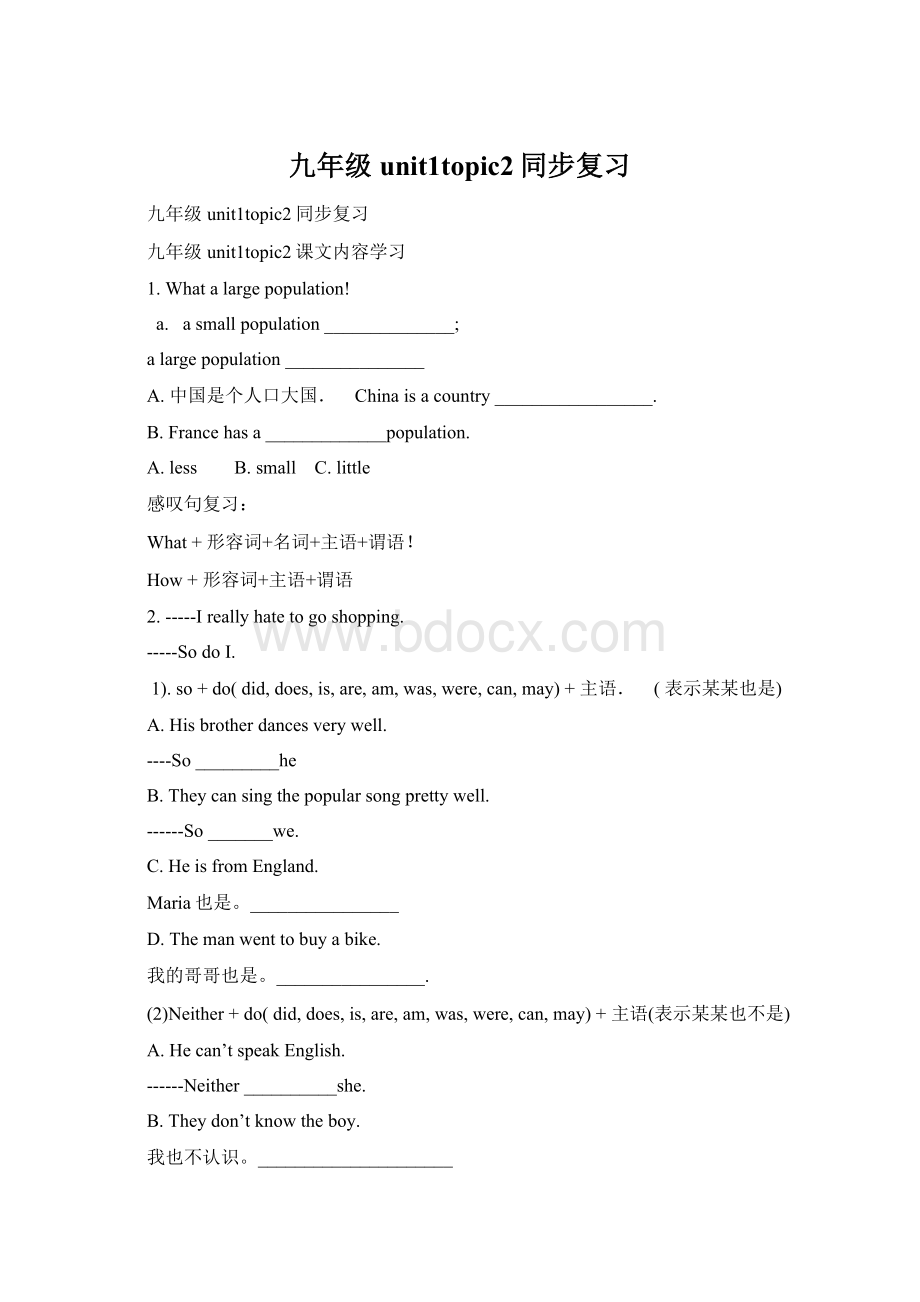 九年级unit1topic2同步复习Word格式文档下载.docx
九年级unit1topic2同步复习Word格式文档下载.docx
- 文档编号:16856981
- 上传时间:2022-11-26
- 格式:DOCX
- 页数:14
- 大小:25.09KB
九年级unit1topic2同步复习Word格式文档下载.docx
《九年级unit1topic2同步复习Word格式文档下载.docx》由会员分享,可在线阅读,更多相关《九年级unit1topic2同步复习Word格式文档下载.docx(14页珍藏版)》请在冰豆网上搜索。

我的哥哥也是。
________________.
(2)Neither+do(did,does,is,are,am,was,were,can,may)+主语(表示某某也不是)
A.Hecan’tspeakEnglish.
------Neither__________she.
B.Theydon’tknowtheboy.
我也不认识。
_____________________
C.Sheisn’ttallatall.
她的妈妈也不高。
_______________________
(3Thepopulationindevelopingcountriesisgrowingfaster.
----Soitis.(是这样)
a.So+主语+助动词.(表示赞成)
A.Heistallerthanmybrother.
----Sohe_____
B.TheycanspeakEnglishverywell.
他们也可以。
__________________
C.ShewenttovisittheGreatwallyesterday.
----Soshedid.
D.Myfatherusedtosmokealot.
---Sohe______
(4)前面既有肯定又有否定或两个谓语时用soitis/waswithsb(也可以用soitisthesamewithsb)
---Helikesapplesandhedoesn'
tgotoschoolbybus.
---Soitiswithher.
(5)既有系动词又有实意动词的时候就只能用后者如:
这句话中既有loves又有is,所以就只能说Itisthesamewithme用it代替上面所有的内容
---HelovesEnglishandheisgoodatit.
---Itisthesamewithme
3.GreatchangeshavealreadytakenplaceinChinarecently.
(1).takeplace表示“发生、举行、举办”,一般指非偶然性事件的“发生”,即这种事件的发生一定有某种原因或事先的安排。
A.我们城市最近三年发生了巨大的变化.
____________________havealready_________________inourcity.
B.Greatchanges______________________inIndiaintherecentyears.
A.havebeentakenplace
B.havetakenplace
C.havehappened
(2)happen作“发生、碰巧”解,常指具体事件的发生,特别指那些偶然的或未能预见的“发生”,一般用于偶然或突发性事件=occur
A.Whathappenedtoyou?
B.Ihappenedtoseehimonmywayhome.
C.Whathasoccurred?
=Whathashappened?
)
(3)comeabout表示“发生、产生”,多指事情已经发生了,但还不知道为什么,常用于疑问句和否定句。
例如:
A.WhenMotherwokeup,shedidn'
tknowwhathadcomeabout.
B.Doyouknowhowtheairaccidentcameabout?
(4)breakout意思为“发生、爆发”,常指战争、灾难、疾病或者争吵等事件的发生,也可以表示突然大声叫喊等。
A.Twoworldwarsbrokeoutlastcentury.
B.Afirebrokeoutinthehospitalinthemid-night.
4.Becauseofourcountry’sone-childpolicy,nowmostfamilieshaveonlyonechild.
a.becauseof+__________________;
because+__________________
A.Hedidn’tgotoschool________________hismother’sillness.
A.becauseof
B.because
C.since
5.Iusedtobea“littleemperor”.
a.usedtodo____________;
beusedtodo________;
beusedtodoing__________
A.他过去常抽很多烟. He_____________________alot.
B.笔用来写字.
Pensare_________________________.
C.我已经习惯于熬夜. Iam_________________________up.
D.Hisbrotherisusedto_________inGuangzhou.
A.live
B.living
6.Myparentsareverystrictwithme.
a.bestrictwithsb___________________;
b.bestrictin
A. 我的英语老师对我们要求很严格.
OurEnglishteacherisvery____________________usinEnglish.
B.Hisfatherisverystrict________him_______hisstudy.
A.with;
in
B.in;
with
C.with;
D.in;
in
7.What’sthepopulationoftheU.S.A?
a.广东的人口有多少?
___________________________________Guangdong?
=HowmanypeoplearethereinGuangdong?
8.Alargepopulationcausesmanydifficulties,notonlyforeveryfamily,butalsoforthewholenation,ithasbecomeaseriousproblem.
(1)notonly……butalso表示不仅……而且
notonly…butalso应连接两个相对称的并列成分。
NotonlyMrLinbutalsohissonjoinedthePartytwoyearsago.(连接两个主语)
Inotonlyplaytennisbutalsopractiseshooting.(连接两个谓语动词)
Heplaysnotonlythepianobutalsotheviolin.(连接两个宾语)
TheyspeakEnglishnotonlyinclassbutalsointhedormitory(连接两个地点状语)
(2)notonly…butalso连接两个分句,并且notonly位于句首时,第一个分句中的主语和谓语要部分倒装。
Notonlydoesthesungiveuslightbutalsoitgivesusheat.
NotonlydidhespeakEnglishcorrectly,butalsohespeaksitfluently.
Notonlyisthisyoungmancleverbutalsoheishardworking.
(3)notonly…butalso连接两个主语时,谓语动词要和与其最近的主语保持人称和数的一致。
Notonlythestudentsbutalsotheteacherwasagainsttheplan.
Notonlytheteacherbutalsothestudentswereagainsttheplan.
(4)notonlyAbutalsoB=BaswellasA,但前者的强调重点在B;
后者的强调重点也在B.(汉译时,要先译aswellas后面的词)例如:
Thechildisnotonlyhealthybutalsolively.
=Thechildislivelyaswellashealthy.这孩子既健康又活泼。
Itconcernsnotonlymebutalsoyou.
=Itconcernsyouaswellasme.这件事不但与我有关,而且也与你有关。
(5)练习:
不只你,我也饿了.____________________________________
她不仅会唱歌,而且会跳舞。
__________________________________-
那个地方不但很冷而且很潮湿______________________________________
他法语和英语都说得好___________________________________________
我们不仅冬天去那儿,而且夏天也去。
________________________________
9.Chinahasdonesomethingtocontrolthepopulation.
a.dosomethingto;
takemeasurestodo_________________
B.政府应该采取措施来解决污染问题.
Thegovernmentshould___________________________thepollution.
10.Oneanswerisknownastheone-childpolice
(1)beknownas什么样的名人=befamousas
Sheisknownasasinger.
(2)beknownfor因什么而出名
Sheisknownforhergreatvoice.
(3)beknowntodo做什么出名
Heisknowntoeatalot.
(4)beknownby在什么人中有名
Heisknownbyhisclassmatesasasinger.
(5)befamous/knowntosb.被某人所知道
练习:
根据句子的意思在括号里填入适当的词或翻译。
1).Hangzhouisknown_______itsbeautifulWestLake.
2).Chaplinisfamous________hisfilms.
3).Chaplinisfamous________anartist.
4).Heisknown________thepolice.
10.Thankstothepolicy,Chinaisdevelopingquicklyandpeople’slivingconditionsareimprovingrapidly.
a.thanksto_______________
A.幸好有你的帮助,我才能通过考试.
____________________yourhelp,Ipassedtheexam.
B.__________thesatellites,wecanseemanyprogramsfromforeigncountries.
A.Thanksfor
B.
Thanksto
C.Thankto
11.IlivedinasmallmountaintowncalledFaimont.
a.sb/sthcalled….______________
A.
你认识那个叫做Maria的女孩子吗?
Doyouknow_____________________Maria?
B.
Ihavebeentoacity____________Shenzhen.
A.calling
B.called
C.names
D.TheboynamedTomismybrother.
=TheboywhoisnamedTomismybrother.
12.Peoplehavetostudyandworkhardtokeepupwiththequickdevelopmentofmodernsociety.
a.keepupwith…_______________
A.如果你不认识学习, 你就不能跟上你的同学.
Ifyoudon’tstudyhard,youcan’t_________________your_________.
13.Ican’tgoshoppinginbigstoresunlessItravelforacoupleofhours.
a.unless_______________
A.如果你不努力学习英语, 你就不会学好它.
Youwon’tlearnEnglishwell_________you_______ithard.
B.Iwon’tgotoherpartyunlessshe_________me.
A.invites
B.willinvite
C.isgoingtoinvite
四、语法点---直接引语和间接引语
引述别人的话时,一般采用两种方式:
一是引用别人的原话,把它放在引号内,称为直接引语;
二是用自己的话加以转述,被转述的话不放在引号内,称为间接引语。
间接引语在大多数情况下是一个宾语从语。
直接引语变成间接引语时,要注意以下几点:
人称变化、时态变化、宾语从句要用陈述句语序。
1.直接引语是陈述句,变成间接引语时,由连词that引导。
Shesaid,"
Iamveryhappytohelpyou."
→
Shesaidthatshewasveryhappytohelpyou.
2.直接引语是一般(选择/反意)疑问句,变成间接引语时,由连词whether或if引导。
Heaskedme,"
Doyoulikeplayingfootball?
"
Heaskedmeif/whetherIlikedplayingfootball.
注意:
大多数情况下,if和whether可以互换,但后有ornot,或在动词不定式前,或放在介词后作连接词时,一般只用whether。
Sheaskedmewhetherhecoulddoitornot.
Hehesitatedaboutwhethertodriveortakethetrain.
3.直接引语是特殊疑问句,变成间接引语时,由相应的疑问词who,whom,whose,how,when,why,where等引导。
Mysisteraskedme,"
Howdoyoulikethefilm?
MysisteraskedmehowIlikedthefilm.
4.直接引语是祈使句,变成间接引语时,把动词原形变成动词不定式,并在动词不定前加tell,ask,order等的宾语。
Thecaptainordered,"
Bequiet."
Thecaptainorderedustobequiet.
此种情况的否定句,在动词不定式前加not。
Myteacheraskedme,"
Don'
tlaugh."
Myteacheraskedmenottolaugh.
5.一些注意事项
(1)直接引语是客观事实、普遍真理等,变成间接引语时,时态不变。
Theytoldtheirson,"
Theearthgoesroundthesun."
Theytoldtheirsonthattheearthgoesroundthesun.
(2)直接引语变间接引语时,指示代词、时间状语、地点状语等要作相应的变化。
如:
this/that→these/those,now→then,today→thatday,yesterday→thedaybefore,lastyear→theyearbefore,ago→before,here→there等。
Hesaid,"
Ihaven'
tseenhertoday."
Hesaidthathehadn'
tseenherthatday.
如果转述时就在原来的地方,就在说话的当天,就不必改变指示代词、时间状语、地点状语等。
(3)间接引语一般要用陈述句的语序,即主、谓、宾的顺序。
HeaskedLucy,"
Wheredidyougo?
HeaskedLucywhereshewent.
Tomsaid,"
Whatdoyouwant,Ann?
TomaskedAnnwhatshewanted.
六、ifwhether区别(详见附件)
七、练习
(一)知识点练习
()1.Shehas_____thiscarfornearlytenyears.
A.buyB.boughtC.haveD.had
()2.Youcan’ttrustwhathesaid,youshouldgoand_____foryourself.
A.lookB.seeC.findD.study
()3.—Isitinterestingtoplaycomputergames?
—Yes,_____youareinterestedinplayingcomputergames,you’llhavetroublegivingitup.
A.onceB.twiceC.asD.assoonas
()4.Thesupermarketprovidescustomers_____plasticbagsforfree.
A.onB.withC.ofD.in
()5.Ithinkit’sgood_____us_____eathealthyfood.
A.for;
toB.for;
forC.to;
forD.to;
to
()6.Weshoulddoourbesttohelphomelesspeoplelivea_____life.
A.happilyB.badC.normalD.terrible
()7.Thetrafficinthecity_____beterrible,butnowithasimprovedalot.Ithinkyouwill_____itsoon.
A.useto;
usetoB.getusedto;
usedto
C.usedto;
getusedtoD.getusedto;
useto
()8.Hisfatherhasworkedinthisfactory_____hecameherein1980.
A.sinceB.forC.whenD.howlong
()9.ProjectHopeis_____tohelpthepoorchildrengotoschool.
A.ai
- 配套讲稿:
如PPT文件的首页显示word图标,表示该PPT已包含配套word讲稿。双击word图标可打开word文档。
- 特殊限制:
部分文档作品中含有的国旗、国徽等图片,仅作为作品整体效果示例展示,禁止商用。设计者仅对作品中独创性部分享有著作权。
- 关 键 词:
- 九年级 unit1topic2 同步 复习
 冰豆网所有资源均是用户自行上传分享,仅供网友学习交流,未经上传用户书面授权,请勿作他用。
冰豆网所有资源均是用户自行上传分享,仅供网友学习交流,未经上传用户书面授权,请勿作他用。


 如何打造酒店企业文化2刘田江doc.docx
如何打造酒店企业文化2刘田江doc.docx
